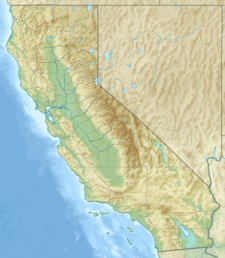Bolam Glacier facts for kids
Quick facts for kids Bolam Glacier |
|
|---|---|
| Type | Mountain glacier |
| Location | Siskiyou County, California, U.S. |
| Coordinates | 41°24′55″N 122°12′02″W / 41.41528°N 122.20056°W |
| Area | 2 sq mi (5.2 km2) |
| Length | 1.4 mi (2.3 km) |
| Thickness | 70 ft (21 m) average |
| Terminus | Moraine |
| Status | Expanding |
The Bolam Glacier is a large glacier found on the north side of Mount Shasta in California, U.S.. It's the second longest glacier in California. Only the nearby Whitney Glacier is longer. It's also the fourth largest in terms of size and amount of ice. Other big glaciers near it are the Hotlum Glacier, Whitney Glacier, and Wintun Glacier.
Contents
About the Bolam Glacier
The Bolam Glacier is a type of glacier that forms in mountains. It is located in Siskiyou County, California. This glacier is a big river of ice that moves very slowly.
Where is the Bolam Glacier?
The Bolam Glacier is on the northern side of Mount Shasta. Mount Shasta is a very tall volcano in northern California. The glacier starts high up on the mountain. It flows down a steep slope towards the north.
How Big is the Bolam Glacier?
The Bolam Glacier covers an area of about 2 square miles (5.2 square kilometers). It is about 1.4 miles (2.3 kilometers) long. The ice is about 70 feet (21 meters) thick on average.
The glacier begins in a bowl-shaped area called a cirque. This cirque is on the north side of Mount Shasta's main peak. The moving ice starts below a large crack called a bergschrund. This crack is at about 12,600 feet (3,840 meters) high. Above this, there is permanent snow and ice reaching up to 13,500 feet (4,115 meters). The glacier ends at about 9,800 feet (2,987 meters) high.
What's Happening to the Glacier?
In 2002, scientists studied Mount Shasta's glaciers. It was the first detailed study in 50 years. They found that seven of the glaciers had grown between 1951 and 2002. The Hotlum and Wintun glaciers almost doubled in size. The Bolam Glacier grew by half. The Whitney and Konwakiton Glaciers grew by about a third.
However, since 2007, many mountain glaciers in the western United States have been shrinking. This is due to warmer temperatures around the world.
 | Dorothy Vaughan |
 | Charles Henry Turner |
 | Hildrus Poindexter |
 | Henry Cecil McBay |


